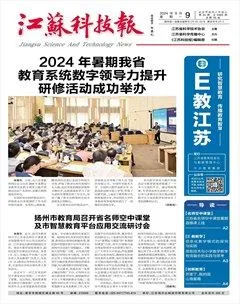Generative AI in education:Educator and expert views (Ⅰ)
譯題:教育中的生成式人工智能——教育者與專家觀點(一)
Product by The Open Innovation Team and Department for Education" 英國政府開放創新團隊及英國教育部
Introduction
Over the last year, interest in and use of generative artificial intelligence (GenAI) has rapidly increased. GenAI uses foundation models, including large language models (LLMs), trained on large volumes of data. Notable GenAI foundation models are OpenAI’s GPT-3.5 and GPT-4, which underpin the chatbots ChatGPT and Bing Chat.These tools can be used to produce artificially generated content such as text, audio, code, images and videos. Other examples of GenAI tools include Google Bard, Claude and Midjourney. This technology is also increasingly being integrated within other digital tools.
Although GenAI is not new, recent advances in the underlying technology and greater accessibility mean that the public can now use it more easily. This poses opportunities and challenges for the education sector.
The Digital Strategy Division in the Department for Education (DfE) asked HM Government’s Open Innovation Team (OIT) to explore the opportunities and risks for GenAI in education.
This report contains insights from interviews with teachers and educators at 23 educational institutions, 14 interviews with experts from academia and the education technology (EdTech) industry, a range of quantitative data sources, and key themes from academic and grey literature. We have also drawn on the DfE’s Call for Evidence summary of responses where relevant.
The report covers:
?誗How the sector has responded to and adopted GenAI technology.
?誗Applications and opportunities for GenAI in education.
?誗Reported impact and benefits of GenAI use in education.
?誗Barriers to adoption and risks that GenAI presents for education.
?誗Support the sector would like to receive from the DfE and government.
Key findings
Teachers and experts acknowledge that GenAI could have a transformative impact on education. From helping teachers save time by automating tasks, to improving teaching effectiveness by personalising learning for students, there is significant potential for GenAI to benefit the sector. At the same time, there is considerable concern about the risks it presents, as well as scepticism about whether these can be mitigated.
Use of GenAI among teachers and students has rapidly increased over the last year. By November 2023, 42% of primary and secondary teachers had used GenAI in their role (an increase from 17% in April). Pupils and students may be using GenAI more than their teachers. 74% percent of online 16-24 year olds in the UK have used a GenAI tool.
Evidence on GenAI use in an educational context shows figures ranging from 14% to 67% of students having used GenAI for schoolwork and studies.
Educators are already realising the benefits of using GenAI, namely in helping them save time by creating lesson resources, plan lessons and streamline administrative processes. Reported benefits for students include increased engagement and better support for students with special educational needs and disabilities (SEND) by personalising learning materials.
There is widespread recognition of the risks GenAI presents for education. There is considerable concern around GenAI-enabled academic malpractice, student overreliance on GenAI, as well as ethical, safety and data privacy risks of use. The potential for GenAI to widen educational inequalities was raised. There is also concern that the benefits of GenAI for education will never be fully realised due to barriers to adoption. Lack of knowledge about how to use GenAI, and poor digital skills and infrastructure are limiting further use among teachers. Negative media coverage affects some teachers’ perceptions of GenAI, as well as raises concern about the threat of AI to teacher job security.
There is appetite for government support to ensure GenAI adoption in education is safe, effective, and aligns with good pedagogy. There is little robust evidence on the impact of GenAI in education, with experts emphasising the need to build an impartial evidence base to better understand the impact of GenAI tools on education. Suggestions for the role of government included sharing guidance and best practice and ensuring student data protection and privacy. As the sector adapts to GenAI, experts and educators also highlight the need for a longer-term strategy for artificial intelligence (AI) in education that is future-proofed to keep pace with the evolving nature of this technology.
譯文
簡介
在過去一年里,人們對生成式人工智能的興趣和使用頻次迅速增加。生成式人工智能使用基礎模型,包括大型語言模型,對大量數據進行了訓練。最讓人耳熟能詳的生成式人工智能基礎模型是OpenAI設計的GPT-3.5和GPT-4,它們是聊天機器人ChatGPT和“必應聊天”的基礎模型。生成式人工智能工具如谷歌Bard、 Claude和Midjourney,可以生成各種內容,如文本、音頻、代碼、圖像和視頻。生成式人工智能技術也被越來越多地集成到其他數字工具中。
雖然生成式人工智能并不是什么新鮮事物,但最近基礎技術的進步和更大的可訪問性意味著公眾現在可以更容易接觸和使用它。這也給教育部門帶來了機遇和挑戰。
英國教育部的數字戰略部門要求英國政府的開放創新團隊探索生成式人工智能在教育中的機遇和風險。
本報告包含了對23個教育機構的教師和教育工作者以及來自學術界和教育技術行業的14個專家的訪談結果,一系列定量數據來源,來自學術和灰色文獻的關鍵主題,等等。我們還借鑒了英國教育部門的相關回應證據摘要。
該報告主要涵蓋了:
教育界如何應對和采用生成式人工智能技術。
生成式人工智能在教育中的應用和機會。
生成式人工智能在教育中使用的影響和好處。
生成式人工智能給教育帶來的適應障礙和風險。
該行業希望得到教育部和政府的支持。
主要調查結果
教育者和相關專家們都認為,生成式人工智能可能會對教育產生變革性的影響。從通過自動化任務幫助教師節省時間,到通過為學生提供個性化學習服務來提高學習效率,可以看出生成式人工智能對教育有巨大的應用潛力和益處。與此同時,人們對它所帶來的風險表示了相當大的擔憂,以及對能否減輕這些風險表示懷疑。
在過去的一年中,使用生成式人工智能的教師和學生人數迅速增加。到2023年11月,42%的中小學教師使用了生成式人工智能課程(較同年4月份的17%來說有所增加)。學生可能比教師更多地使用生成式人工智能。在英國,74%的16~24歲在線用戶使用過生成式人工智能工具。
有關在教育環境中使用生成式人工智能的數據顯示,14%~67%的學生在完成作業和日常學習中使用生成式人工智能。
教育工作者們已經意識到使用生成式人工智能的好處,如生成式人工智能能夠通過創建課程資源、對課程進行計劃和安排、簡化行政流程來幫助教師節省工作時間。據報道,生成式人工智能對學生的好處包括,通過個性化的學習材料提高了學生的參與度,并為有特殊教育需求和殘疾的學生提供了更好的支持。
人們普遍認識到生成式人工智能可能會對教育帶來風險,如學術不端、學生過度依賴生成式人工智能以及倫理、安全和數據隱私等方面的風險,并為此感到相當擔憂。有人擔心生成式人工智能擴大了教育不平等的可能性。還有人擔心由于在教育中采用方面的障礙,生成式人工智能對教育的好處永遠無法充分實現。另外,缺乏關于如何正確使用生成式人工智能的知識,以及糟糕的數字技能和基礎設施,限制了教師進一步使用生成式人工智能。還有一些負面的媒體報道影響了一些教師對生成式人工智能的看法,同時也引發了人們對人工智能會取代教師工作的擔憂。
人們希望得到政府的支持,以確保在教育中采用的生成式人工智能是安全的、有效的,并與良好的教育方法相一致。關于生成式人工智能在教育中的影響,幾乎沒有強有力的證據,因此專家們強調需要建立一個公正的證據基礎,以便更好地了解生成式人工智能工具對教育的影響。專家們還建議政府能夠對教師進行指導并分享最佳實踐的成果,以及確保學生的數據安全和隱私。隨著教育行業適應生成式人工智能,專家和教育工作者認為,需要制定一項面向未來的人工智能教育長期戰略,以便跟上這項技術不斷發展的步伐。

